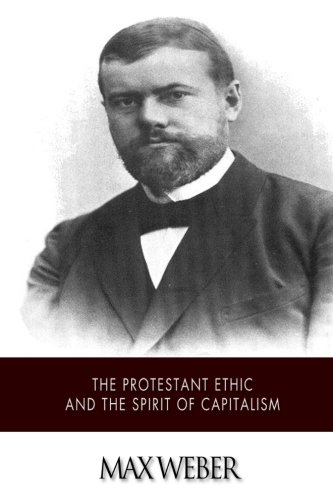

Thus, neither Marx nor Weber alone provides an adequate explanation for the emergence of machine capitalism. The Protestant ethic becomes the spirit of capitalism, and methodically motivates capital accumulation, only when it interpenetrates the first stage of manufacture. While Weber provides an explanation of the nature of this subjective motivation, an explanation of the capacity of the Protestant ethic and the spirit of capitalism to motivate capital accumulation systematically presumes a characterization of the logic of economic production that is developed incompletely in Weber's analysis.

/Max-Weber-Hulton-Archive-Getty-Images-58b88d565f9b58af5c2d9a2e.jpg)
The objective, coercive, competitive constraints found in machine capitalism (the " iron cage ") are absent, and if capital accumulation occurs within this first stage of manufacture, it must be motivated subjectively.

In consequence, increases in production occur with constant returns to scale, competitive constraints are incompletely developed (per unit costs are not reduced), cooperation is simple, and this economic structure is consistent with various traditional as well as with rationalizing values. In Marx's characterization of the first stage of manufacture, economic production is constituted by the formal subsumption of labor under capital and thus the retention of precapitalist processes of production. Showing that modernity is mediated by historical and cultural backgrounds of the society it encounters the essay argues for the potency of the “multiple modernities” paradigm as a better analytical framework for the prosperity gospel in Africa. Does the prosperity gospel demonstrate distinctively modern and anti-modern (or anti-western) themes? Drawing insights from the Akan cultural concepts of well-being, dualistic view of life, and the role of religious functionaries, this essay develops a sustained critique of the classical Eurocentric and unilinear view of modernity used in assessing the prosperity gospel. On the other hand, so-called “enchanted” forms of prosperity refute Weber’s central claim of modern societies. On one hand, the phenomenon inspires entrepreneurship and individual autonomy. Scholars have persistently invoked Weber’s Protestant Ethic yet findings reveal the prosperity gospel in Africa challenges dominant conceptualizations of modernity. The role of African Neo-Pentecostalism in effecting modernity through its widespread “prosperity gospel” remains inconclusive.


 0 kommentar(er)
0 kommentar(er)
